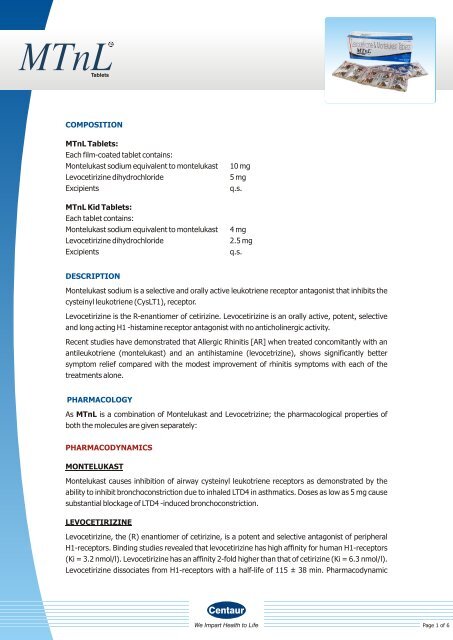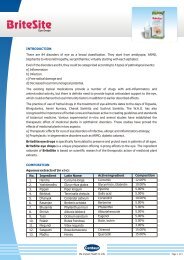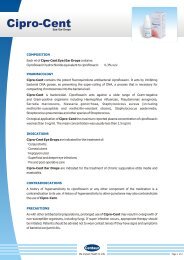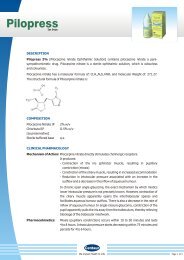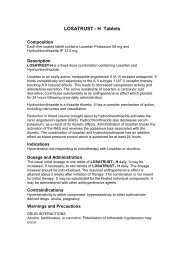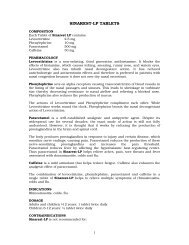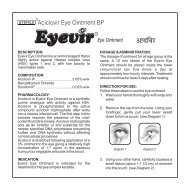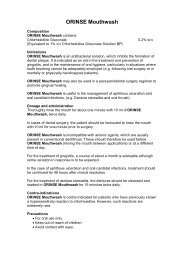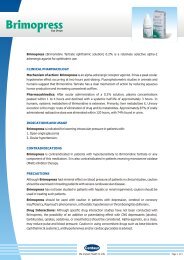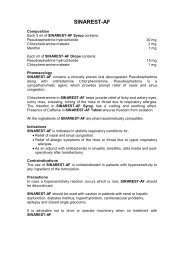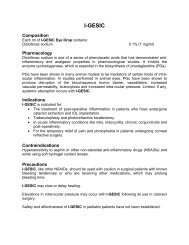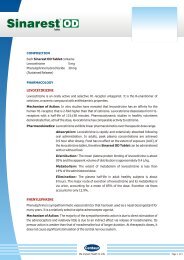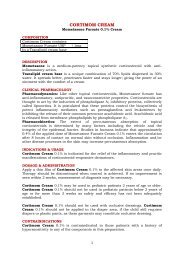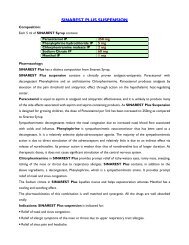MTnL / MTnL Kid Tablet
MTnL / MTnL Kid Tablet
MTnL / MTnL Kid Tablet
- No tags were found...
You also want an ePaper? Increase the reach of your titles
YUMPU automatically turns print PDFs into web optimized ePapers that Google loves.
PRESS RELEASEDMCC to develop and seed commodity-linkedinvestment products• Launch DMCC-owned asset management company• Establish joint venture initiative with Shariah Capital• Take 4.99% equity stake and board seat in Shariah CapitalDubai, March 18, 2008: The Dubai Multi Commodities Centre (DMCC)announced today that it has applied for a license to set up a UAEinvestment company - DMCC Asset Management Company (DCAM) - thatwill develop and seed commodity-linked investment products fordistribution in the UAE and other markets. DCAM will be registered as aDMCC Free Zone Company and established with an initial capital of AED25 million. It will be 100 per cent owned and managed by the DMCC.The DMCC also announced that it will develop and manage a range ofSharia’a compliant investment products focused on commodities througha joint venture initiative between DCAM and Shariah Capital, a U.S.-based, publicly-traded company on the Alternative Investment Market(AIM) of the London Stock Exchange. The joint venture entity, DMCCShariah Asset Management Company (DSAM), will be owned 51 per centby DCAM and 49 per cent by Shariah Capital.Ahmed bin Sulayem, Executive Chairman, DMCC commented: "DMCC hasprogressively established itself as a provider of innovative products in itsmandate to promote Dubai as the region's pre-eminent commoditytrading hub. DCAM and DSAM will serve as vehicles which offer theregion's first commodity-linked Shariah-compliant investment products.We believe such products will be of great interest to institutions and highnet worth individuals who are looking beyond the traditional investment
LEVOCETIRIZINEPatients should avoid engaging in hazardous occupation requiring complete mental alertness suchas driving or operating machinery when taking levocetirizine. Precaution is recommended withintake of alcohol and in those who are on CNS depressants.DRUG INTERACTIONSMONTELUKASTIn drug-interaction studies, the recommended clinical dose of montelukast did not have clinicallyimportant effects on the pharmacokinetics of the following drugs: theophylline, prednisone,prednisolone, oral contraceptives (norethindrone 1 mg/ethinyl estradiol 35 mcg), terfenadine,digoxin, and warfarin.Although additional specific interaction studies were not performed, montelukast was usedconcomitantly with a wide range of commonly prescribed drugs in clinical studies without evidenceof clinical adverse interactions. These medications included thyroid hormones, sedative hypnotics,non-steroidal anti-inflammatory agents, benzodiazepines, and decongestants.Phenobarbital, which induces hepatic metabolism, decreased the AUC of montelukastapproximately 40% following a single 10-mg dose of montelukast. No dosage adjustment formontelukast is recommended. It is reasonable to employ appropriate clinical monitoring whenpotent cytochrome P450 enzyme inducers,LEVOCETIRIZINEIn vitro data indicate that levocetrizine is unlikely to produce pharmacokinetic interactions throughinhibition or induction of liver drug-metabolizing enzymes. No in vivo drug-drug interaction studieshave been performed with levocetrizine. Drug interaction studies have been performed withracemic cetrizine.Pharmacokinetic interaction studies performed with racemic cetrizine demonstrated that cetrizinedid not interact with antipyrine, pseudoephedrine, erythromycin, azithromycin, ketoconazole andcimetidine. There was a small decrease (~16%) in the clearance of cetrizine caused by a 400 mgdose of theophylline. It is possible that higher theophylline doses could have a greater effect.Ritonavir increased the plasma AUC of cetrizine by about 42% accompanied by an increase in halflife(53%) and a decrease in clearance (29%) of cetrizine. The disposition of ritonavir was notaltered by concomitant cetrizine administration.Renal Impairment: As levocetrizine is mainly excreted through urine, dosage adjustment maybe required in patients with impaired renal function. Hence this combination should be used withcaution in such patients.Hepatic Impairment: As montelukast is mainly excreted through bile, caution is to be exercisedwhile prescribing this combination in patients with impaired hepatic function.Pregnancy: There are no adequate and well-controlled studies of either montelukast orlevocetrizine in pregnant women. Hence this combination should not be used during pregnancy.Lactation: Since levocetirizine is excreted in breast-milk the combination is not recommendedduring lactation.Page 4 of 6
Pediatric Use:Montelukast: The safety of Montelukast 4-mg chewable tablets in pediatricpatients aged 2 to 14 years with allergic rhinitis is supported by data from studiesconducted in pediatric patients aged 2 to 14 years with asthma. A safety study inpediatric patients 2 to 14 years of age with seasonal allergic rhinitis demonstrateda similar safety profile. The safety and effectiveness in pediatric patients below theage of 12 months with asthma and 6 months with allergic rhinitis have not beenestablished.Levocetirizine: The safety and effectiveness of Levocetirizine in pediatricpatients under 2 years of age have not been established.The effectiveness of Levocetirizine 2.5 mg once daily for the treatment of thesymptoms of seasonal and perennial allergic rhinitis in children 2 to 6 years of ageis supported by the extrapolation of demonstrated efficacy of Levocetirizine 5 mgonce daily in patients 12 years of age and older and by the pharmacokineticcomparison in adults and children. In children 2 to 6 years of age therecommended dose of 2.5 mg once daily should not be exceeded.Geriatric Use:Montelukast: No overall differences in safety or effectiveness were observedbetween these subjects and younger subjects, and other reported clinicalexperience has not identified differences in responses between the elderly andyounger patients, but greater sensitivity of some older individuals cannot be ruledout.Levocetirizine: Clinical studies of levocetirizine for each approved indicationdid not include sufficient numbers of patients aged 65 years and older todetermine whether they respond differently than younger patients. Otherreported clinical experience has not identified differences in responses betweenthe elderly and younger patients.In general, dose selection for an elderly patient should be cautious, usuallystarting at the low end of the dosing range reflecting the greater frequency ofdecreased hepatic, renal, or cardiac function and of concomitant disease or otherdrug therapy.UNDESIRABLE EFFECTSMontelukast: Common side effects include dyspepsia, abdominal pain, rash, dizziness,headache, fatigue, fever, trauma, cough, nasal congestion.Levocetirizine: Use of levocetirizine has been associated with somnolence, fatigue,nasopharyngitis, dry mouth, and pharyngitis in subjects 12 years of age and older. Furtheruncommon incidences of adverse reactions like asthenia or abdominal pain were observed.OVERDOSAGEThere is no data to prove the overdosage of this combination. However, overdosage has beenreported with individual molecules.Page 5 of 6


